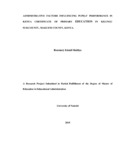Administrative factors influencing pupils’ performance in Kenya certificate of primary education in Kilungu sub.County, Makueni county, Kenya.
Abstract
This study sought to determine the extent to which administrative factors influence pupils’
performance in K.C.P.E in Kilungu Sub County, Makueni Kenya. The study objectives
sought to establish the extent to which provision of teaching and learning resources, teacher
pupil ratio supervision and learning activities and involvement of parents influence pupils
performance in KCPE. It was an ex – post facto descriptive study that targeted all the 57
primary schools, in Kilungu sub-county but sampled 27 head teachers, deputy head
teachers, 27 class teachers and 280 standard eight pupils to take part in the study. Data was
collected using questionnaires and analyzed by calculating frequencies and percentages. It
was then presented using tables, graphs and charts. After the analysis of data it was
established that most of the schools had inadequate teaching and learning resources such as
textbooks, charts and wall maps, and 8% of the teachers rarely used their available
resources and this led to poor K.C.P.E performance. The administration in all the primary
schools provided text books but none had a textbook: pupil ratio of 1:1.In 72% of the
schools the only teaching and learning resources were textbooks while only 8% of the
teachers rarely used the available resources. In 40% of the schools the standard eight
classes had between 20-30 pupils. Majority of the pupils were in other classes signifying
larger classes and high repetition rates associated with low academic performance. The
teachers workload was 18-40 lessons per week and none had teachers’ equivalent to its
C.B.E from the T.S.C. Studies have shown that high workloads compromised effective
class management leading to decline in academic achievement. Only 5% of the head
teachers and deputy head teachers checked the teachers’ schemes and records of work or
pupils progress records. Among the class teachers 50% were not aware of who was
expected to prepare the schemes and records of work in their classes. This displays low
levels of supervision which is likely to compromise effective academic achievement. All
the schools organized parents meetings that were attended by 60% of the standard eight
parents but 61% of the parents never assisted their pupils with their homework while 90%
had never bought a text book for their children. Only 42% discussed academic performance
but none of the schools discussed pupils’ absenteeism with the parents. The study
recommends that schools increase the textbook: pupil ratio to 1:1 and teachers give
assignments to the pupils to ensure use of the books. Teachers should always use the
available teaching resources. The number of teachers should be increased to reduce their
workload and ensure teachers teach one subject in class eight. The school administration
should supervise teaching and learning by checking the teachers’ schemes of work and
lesson plans, class and pupils’ attendance registers. Parents should be involved in the
learning of their pupils through organizing and ensuring they attend school meetings to
discuss academic performance of their children. Suggestions for further studies include: a
study of the causes of the high rates of absenteeism among teacher and pupils, a study of
the administrative capacity of primary school head and deputy head teachers in supervising
teaching and learning and a study of the availability adequacy and use of teaching and
learning resources in primary schools
Publisher
University of Nairobi
Collections
- Faculty of Education (FEd) [6066]

